Last March, the National Book Critics Circle launched The Gregg Barrios Book in Translation Prize. Over the course of the year, a panel of critics met and discussed hundreds of books, resulting in the following longlist. As a member of this committee, my reading life broadened and changed—it was one of my favorite experiences in reading. I’m very happy to share our judges’ appreciations of our selections.
—Adam Dalva, Books Editor, Words Without Borders
A Summer Day in the Company of Ghosts by Wang Yin, translated from the Chinese by Andrea Lingenfelter
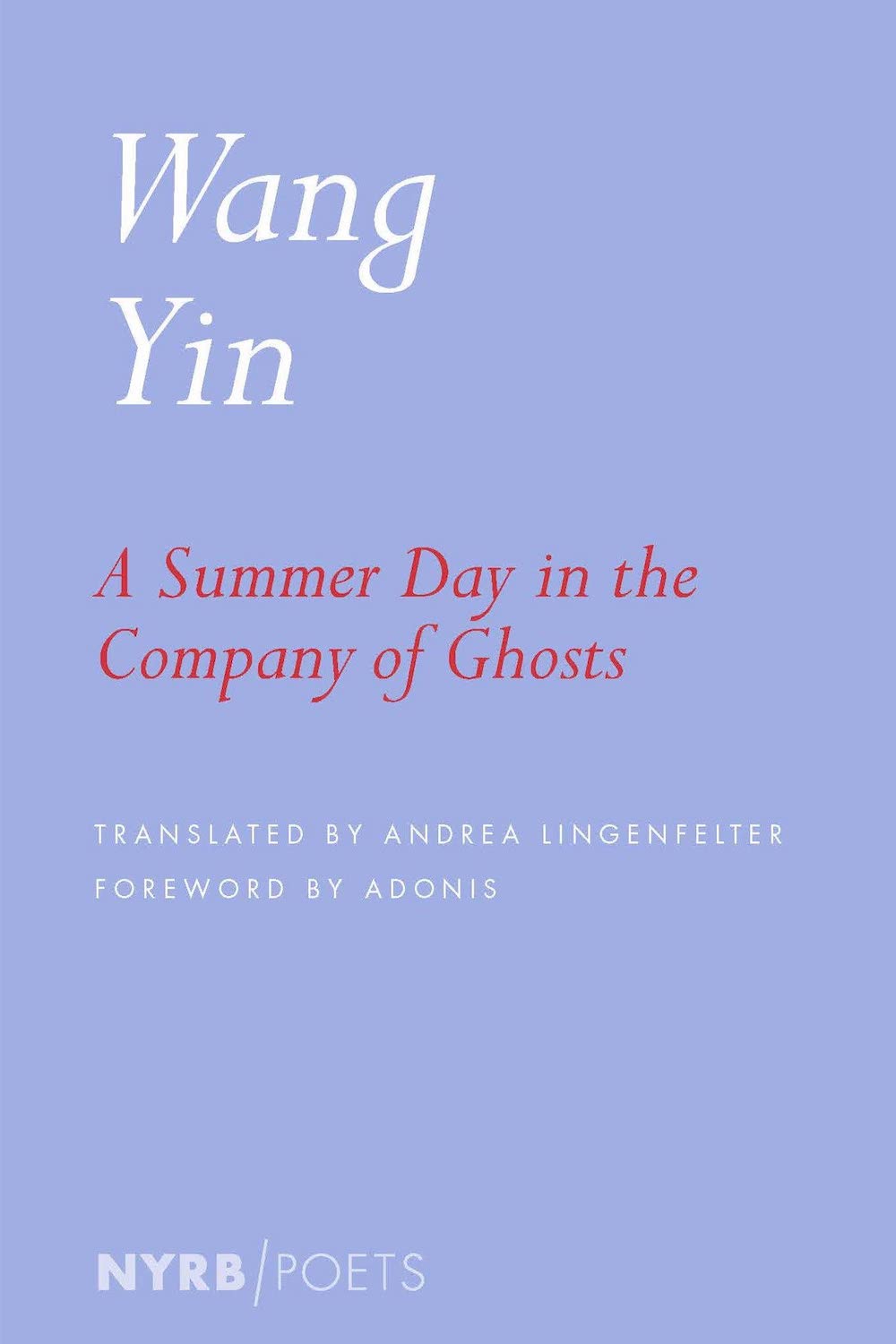
For a selection of poetry that spans almost forty years, Andrea Lingenfelter’s translation of Wang Yin’s A Summer Day in the Company of Ghosts remains surprisingly consistent in theme and style. His poetic obsessions intensify throughout, permeating the poems like a thick fog or—to use the term applied to his generation, the first post-Mao writers—an all-pervasive mist. “The Misty Poets were more concerned with inner turmoil than with class struggle,” Lingenfelter explains in her helpful preface. The tone of such turmoil strikes me here as a kind of melancholic joy. While an “endless ambivalence” clings to this speaker, they also joke with friends and hold conversations with other poets and find relief through the “balm of lyricism”—which Lingenfelter masterfully controls by forgoing punctuation in favor of subtleties of lineation, rhythm, and sound.
Paradoxically, Wang Yin succeeds at conveying the ineffable qualities of interiority through a sensitivity to exterior objects and the powers of imagery. “My poems are flecks of salt clinging ambivalently to a horse’s back,” he writes in “Why Are You Circling Around Me.” And in a moment reminiscent of Wallace Stevens’ “Anecdote of the Jar”—a poem he perhaps came across in his parent’s attic in one of the books the Red Guards overlooked—Wang Yin explores the metaphoric resonances of an empty glass in “Now”:
A frail young woman sets an empty water glass
on the lawnThe glass bends the green blades beneath it
like past events you don’t remember
until someone mentions them
Ultimately, that moment when the past distorts the present lies at the nexus of Wang Yin’s poetry. Though he doesn’t write directly of class struggle or social issues, an awareness of the past routinely interrupts the speaker’s internal reveries, giving them more nuance and an elegiac tinge. The world of these poems might be “too broken to restore, and we / are here only by chance, lingering briefly in this interval.” But Wang Yin’s A Summer Day in the Company of Ghosts also fulfills a deeper charge: to “witness with my own eyes the final instant before the empire crashes down.”
—Mira Rosenthal
A Woman’s Battles and Transformations by Édouard Louis, translated from the French by Tash Aw

Édouard Louis’s mother has appeared in two of his previous books, The End of Eddy (2014) and in Who Killed My Father (2018). In his latest work, A Woman’s Battles and Transformations, she is, for the first time, the protagonist. We discover her real name—Monique—and her face is on the cover. Beyond the basic details about her life, however, there is no repetition among the books: in fiction and nonfiction, Louis does not dabble in mere biography. This is a precise, and I daresay, forensic exploration of his relationship with his mother, both as experience and as emotion.
In Louis and Aw’s rendering, Monique is rarely empathetic, a bitter wife and mother. She has been shaped by two bleak, violent marriages and crushed into exhaustion by low wage, dead-end jobs. As in Who Killed My Father, her fate appears to have been determined by class. Hers should have been a life arc bent toward an end as devastating as the one that befalls Louis’s father, her second husband. Against all predictions, however, Monique has been able to advance, modestly, toward a sense of hope that was alive already in the photograph that sets Louis’s quest—the image of a stranger, youthful and vibrant.
The task is not easy. Louis has never been truly close to Monique, having hid his ordeals as a gay youth from her. The privileges he has acquired—education, money, and fame—have widened that gap. Yet, he is also keenly aware of how their stories are essentially one. The descriptive title of the book could apply to having both battled and metamorphosed, seeking escape from the narrow contours imposed by poverty and abuse. His break, however, is far more tangible than hers will ever be. This divergence fuels guilt and elation, the contrasting emotions that make Louis’s narrative a compelling, indispensable read.
—Maria Barrera-Agarwal
The Books of Jacob by Olga Tocarczuk, translated from the Polish by Jennifer Croft
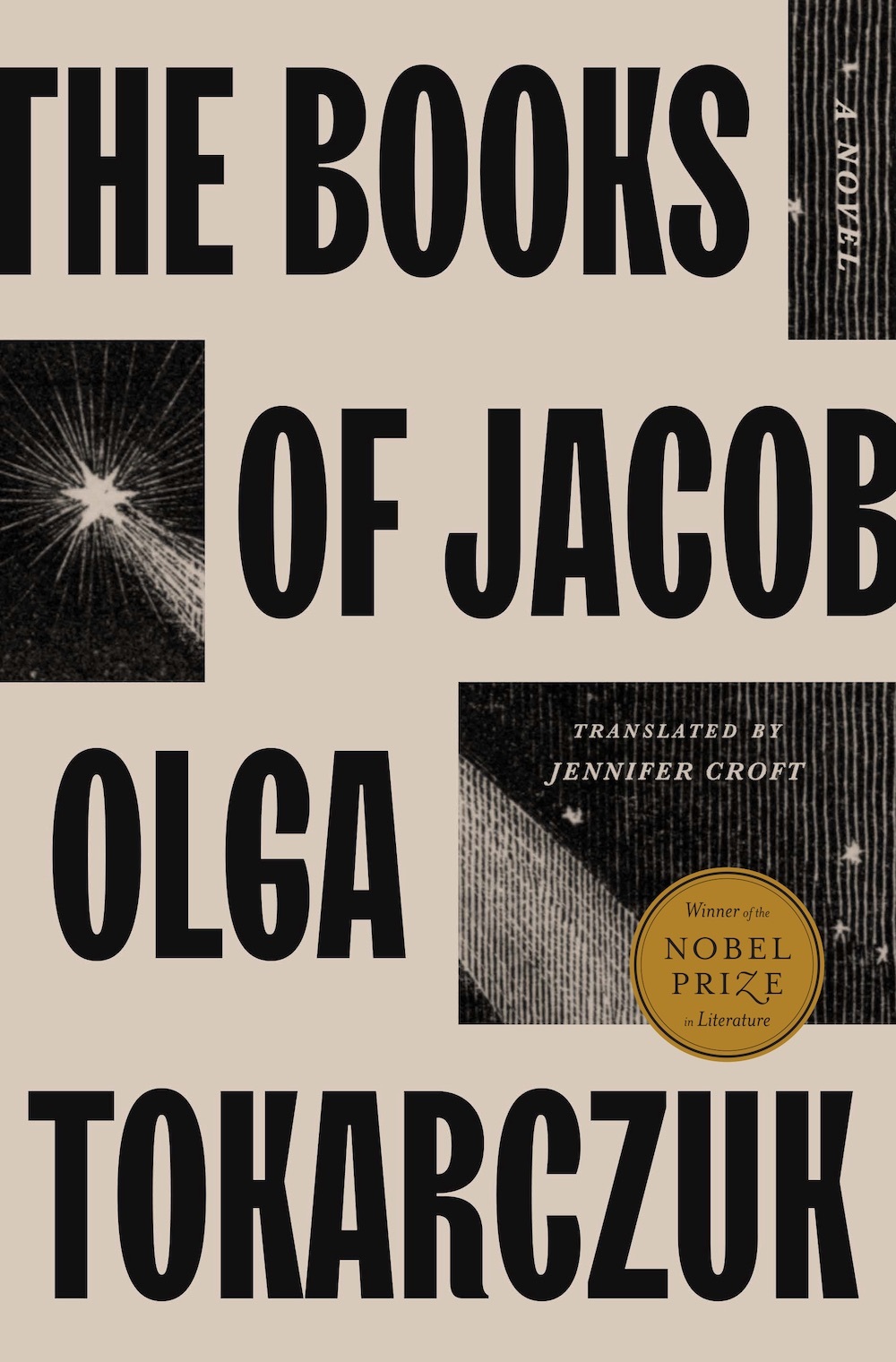
Writing a 300-word appreciation of a 900-page novel is a bit like running a four-minute mile: theoretically possible, but not advisable in the regular course of human achievement. And yet, I leapt at the chance to write about this masterful book, my favorite of 2022, because it has rewired my brain, broadening my perception of what fiction can do. Tocarczuk’s polyphonic rendering of the life of Jacob Frank, real-life eighteenth century cult leader, is immaculately researched, and Jennifer Croft’s translation is a staggering accomplishment in its own right.
There’s a feeling, sometimes, with long novels, of syntactic acquisition. I think, perhaps, of Moby Dick’s cetology chapters, or I Hotel’s sudden code switches between sections, or the harrowing true crime sequence in 2666. These are the moments in reading, all too rare, when everything clicks in, and the project becomes axiomatic. Suddenly, in the case of Books of Jacob, the combination of interpolated journals, photographs, academic research, and a woman who can’t die narrating from an icy cave seems right and fitting, and it is only when the reader returns to other books that they remember just how unprecedented their experience of Tocarczuk’s narrative has been.
The Books of Jacob has so many memorable beats. I think of Frank, locked in his monastery during war, or of the ending in France that shifts styles into something more conventional, or of the epistolary sapiosexual romance between two supporting characters, or of the horrifying scenes of orgy, or of the fascinating blood libel sequence. Frank, throughout, is an enigma, a folk tale constantly in frame yet slightly out of focus. Most of all, though what I think of is the experience of the book itself, the comfort I found in its heft, the page numbers counting down toward apocalypse. This is a novel to return to, though it is unforgettable.
—Adam Dalva
Grey Bees by Andrey Kurkov, translated from the Russian by Boris Dralyuk
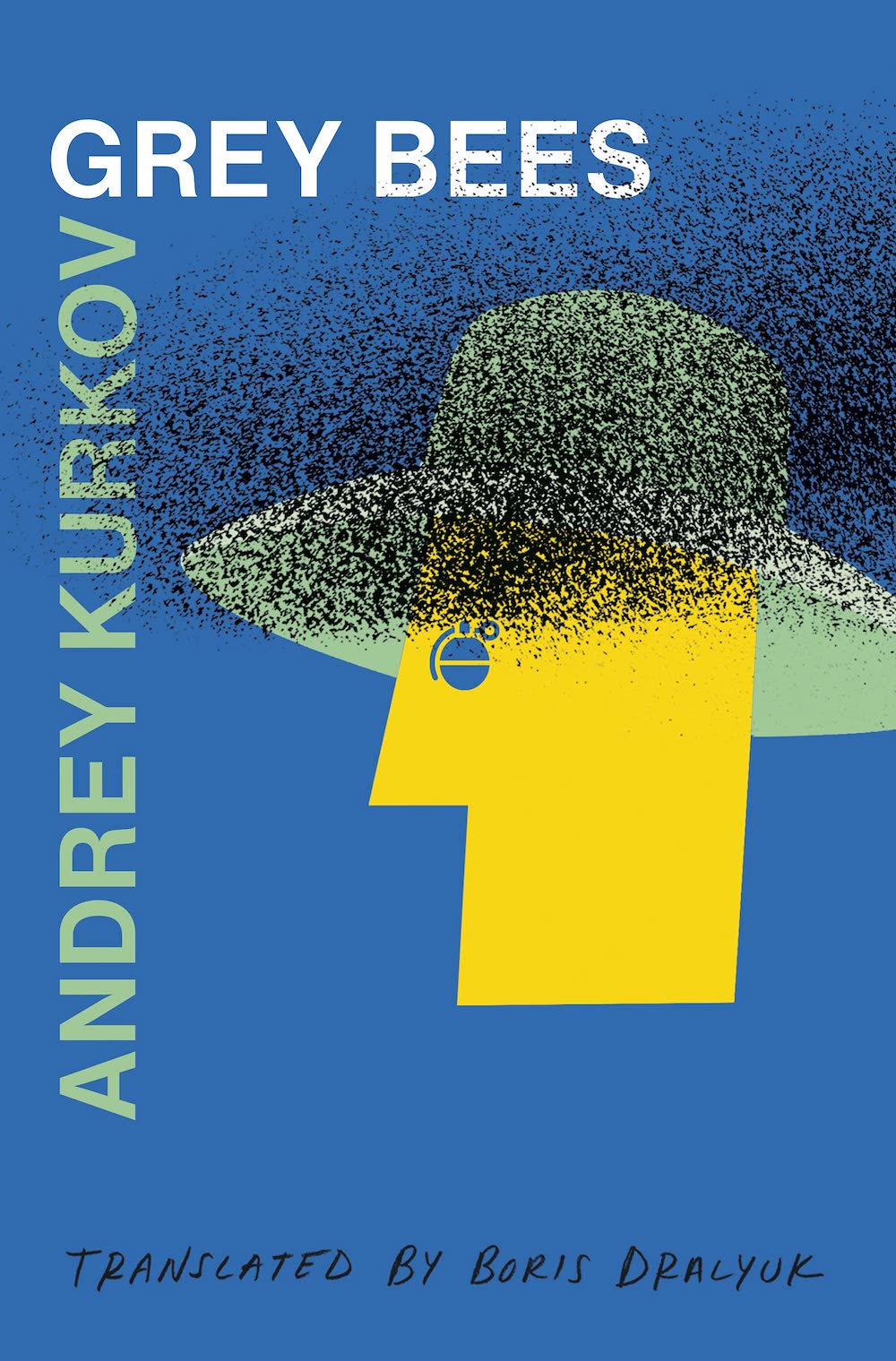
Ukrainian author Andrey Kurkov’s Grey Bees, translated from Russian into English by Boris Dralyuk, is a subtle, captivating novel about an isolated man living in the “gray zone” between Ukraine and the breakaway Donetsk region (prior to the 2022 Russian invasion).
Despite having lived without electricity for years and constant explosions rattling his window panes at night, Sergey Sergeyich stays in place even after his neighbors in the village of Little Starhorodivka have fled to safety. For Sergey, estranged from his daughter and ex-wife, life centers around the maintenance of his apiary, which he tends to constantly and lovingly insulates in the winter. Living beyond the reach of the post and his pension checks, Sergey treats honey as liquid gold, bartering for bread, eggs, and other scarce necessities that he once took for granted. He puts the conflict and its consequences as far from his mind as possible, diminishing the threat of a war he sees as absurd. Nocturnal missile strikes are the habits of “fools [who] can’t get to sleep” and are “probably just warming their hands” by pulling triggers.
At the novel’s open, leaving Little Starhorodivka is unthinkable: where would Sergey take his bees? It is the natural world after all, not the human, that has always been Sergey’s consolation. However, after a dead body lies for days in a frozen field outside his home and with his bees buzzing nervously when strikes hit close to their hives, the former mine inspector’s terse nonchalance begins to fade. Staying in place, which has allowed the resolutely nonpartisan Sergey to avoid taking sides in the conflict, becomes untenable. After loading his beehives onto a trailer and hitching it to his Russian Lada, Sergey drives through checkpoints into the Zaporizhzhia region and eventually onward to annexed Crimea to visit one of his few friends, a Tatar and fellow beekeeper.
Grey Bees, thanks to Dralyuk’s translation, offers Anglophone readers a nuanced, deeply human understanding of the cost of the 2014 aggression against Ukraine. The novel, which Kurkov calls his “personal farewell to the Crimea that may never exist again,” artfully illuminates the tragedies suffered on Ukrainian lands while maintaining a broad, humanistic focus on the crisis’s aftermath.
—Tara Merrigan
Kibogo by Scholastique Mukasonga, translated from the French by Mark Polizzotti
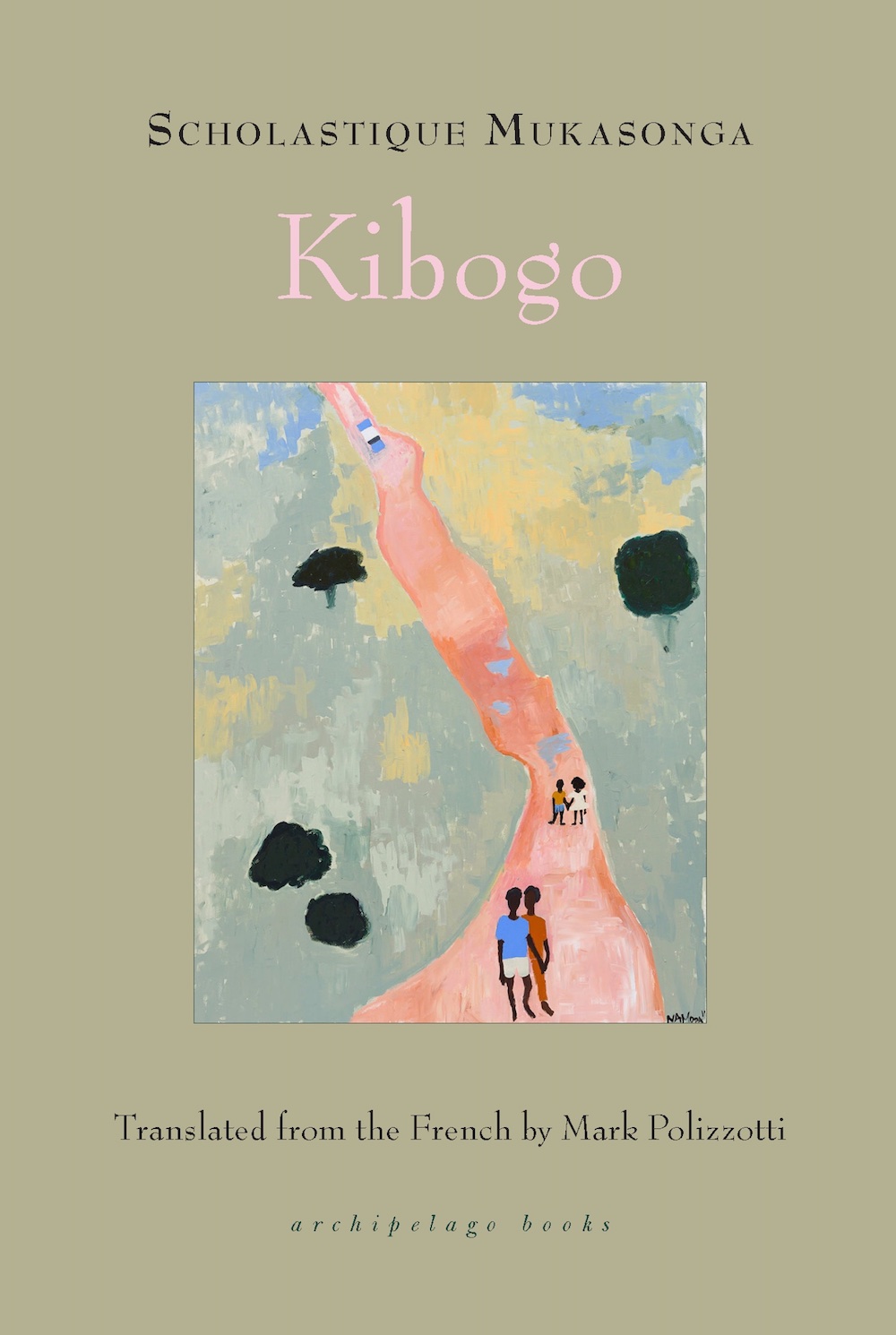
Kibogo, the old men say, was the son of a great King: a godlike figure with the power to summon the rain. When Rwanda is ravaged by drought, the villagers climb Kibogo’s mountain to ask him “to convince the rains to return.”
So far, five of French-Rwandan writer Scholastique Mukasonga’s books have been made available in English—two novels and three memoirs. Kibogo is one of the former, a novel with the light, airy structure of a short story collection. Its 152 pages explore the ever-evolving nature of Kibogo, this mythical personage who survives the Christian missionaries intent on erasing him, and the white archeologists who are determined to replace the local legends with ones better suited to their theories. Somewhere in between, we meet a young seminarian who fuses Christianity with the old myth and sets himself up as a latter-day Kibogo/Jesus, creating chaos and confusion among everyone he encounters.
Mukasonga preserves Rwandan culture in her writing with the skill of an ethnographer and the scalpel of a seasoned satirist. But whether she is remembering the family members and home she lost in the 1994 genocide or describing the many transformations and adaptations that the myth of Kibogo undergoes in order to endure, she engages with her readers in a quiet, intimate voice (whether her own or that of a third-person narrator) that translator Mark Polizzotti ingeniously channels into vibrant English prose. She celebrates her characters’ unique qualities through the telling of their stories, choreographing her troupe with the aptitude of Charles Dickens or Zora Neale Hurston at their most animated. We are introduced to men, women, and children—by turns comical, hypocritical, pragmatic, stubborn, and opportunistic—who all play parts in the vibrant story of Rwanda. As does Kibogo, who remains preserved in the people’s hearts, ever-evolving and changing, demonstrating the elasticity and resilience of our closest-held beliefs.
—Tara Cheesman
Linea Nigra: An Essay on Pregnancy & Earthquakes by Jazmina Barrera, translated from the Spanish by Christina MacSweeney
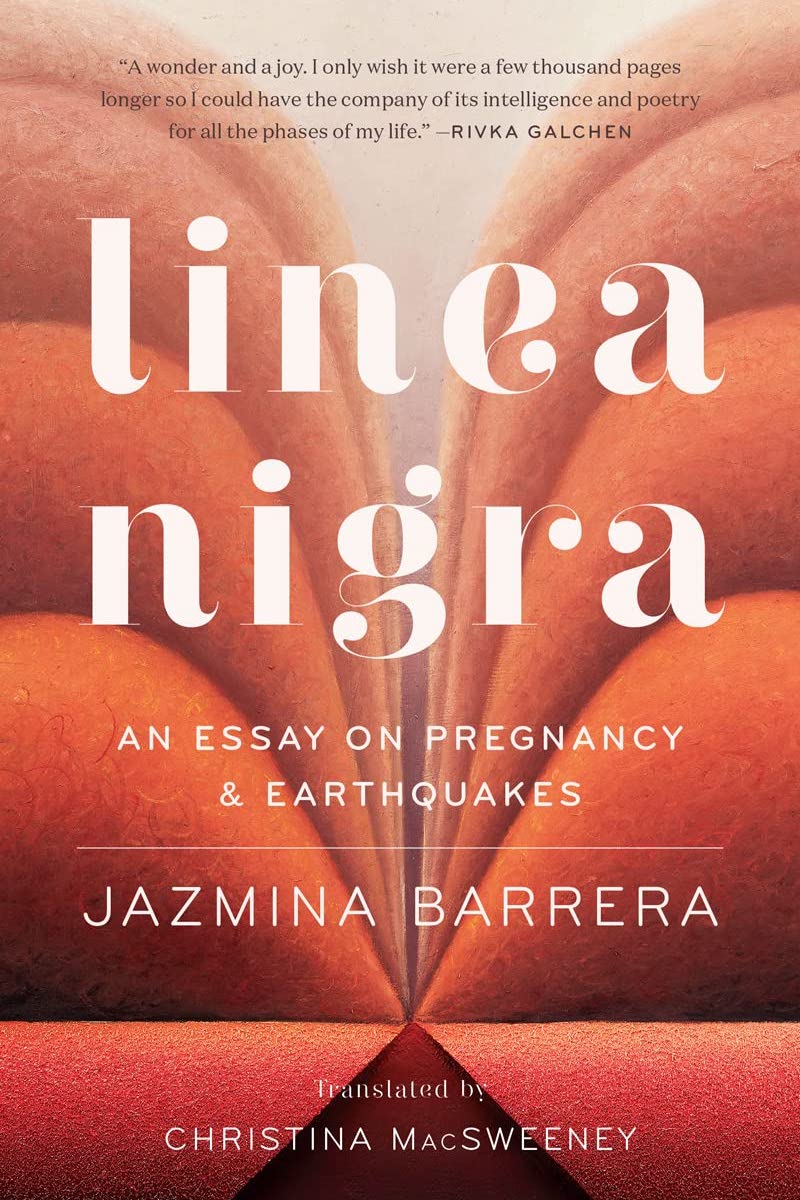
Linea Nigra—a book named for the line, running from navel to pubis, that darkens during pregnancy—focuses on both “the transformations of the body” during pregnancy and new motherhood and the artistic renderings of bodies in these states by artists including Niki de Saint Phalle and Leonora Carrington. Jazmina Barrera considers the challenges of creating literary work during and about this time of life, challenging both because such work has often been disregarded as trivial and because the creators and subjects of these images are often, like Barrera, contending with the demands of motherhood. Barrera moves from the “transforming body” to image and back again, crediting her mother, a painter, with these ideas:
1. Paintings can’t be reproduced by photographic means. They have to be seen firsthand, close up, from a distance, calmly, because a painting is not an image; it is matter.
2. The etymological root of the word “matter” is the Latin mater: “mother.”
Though grounded in first-person experience, Barrera extends her consideration of mother as “matter” into prismatic perspectives on motherhood in relation to myth and planetary events, including the devastating 2017 earthquake in Mexico.
On Lighthouses, Barrera’s English-language debut, and Linea Nigra, are both associative, fragmentary works bound by theme and by voice as rendered by formidable translator Christina MacSweeney. The style is at once assured and full of doubt, expansive and precise. MacSweeney has said that the common element among the many Latin American texts she’s translated is that they all “require an active reader.” That’s true of this volume, which constellates an array of fragments, images, observations, and recollections into a Bachelardian nest in the “realm of mothers” (the title of a painting by Barrera’s mother, drawn from the name of a timeless void mentioned in Faust).
Once Barrera’s son is born, she composes in notes on her phone: “I know I have only a little time so I stick to the point. I write from the sheer joy of being able to do so.” Although the author is refreshingly open about the primal vulnerability of “giving life from her own life—from her time, her arms, her breasts,” an engaged reader will come away with a sense of the cosmic scale of this life-giving activity, its worthiness as a subject for literature, and a lingering enchantment with the “sheer joy” and acuity of the writing.
—Heather Green
The Pachinko Parlor by Elisa Shua Dusapin, translated from the French by Aneesa Abbas Higgins
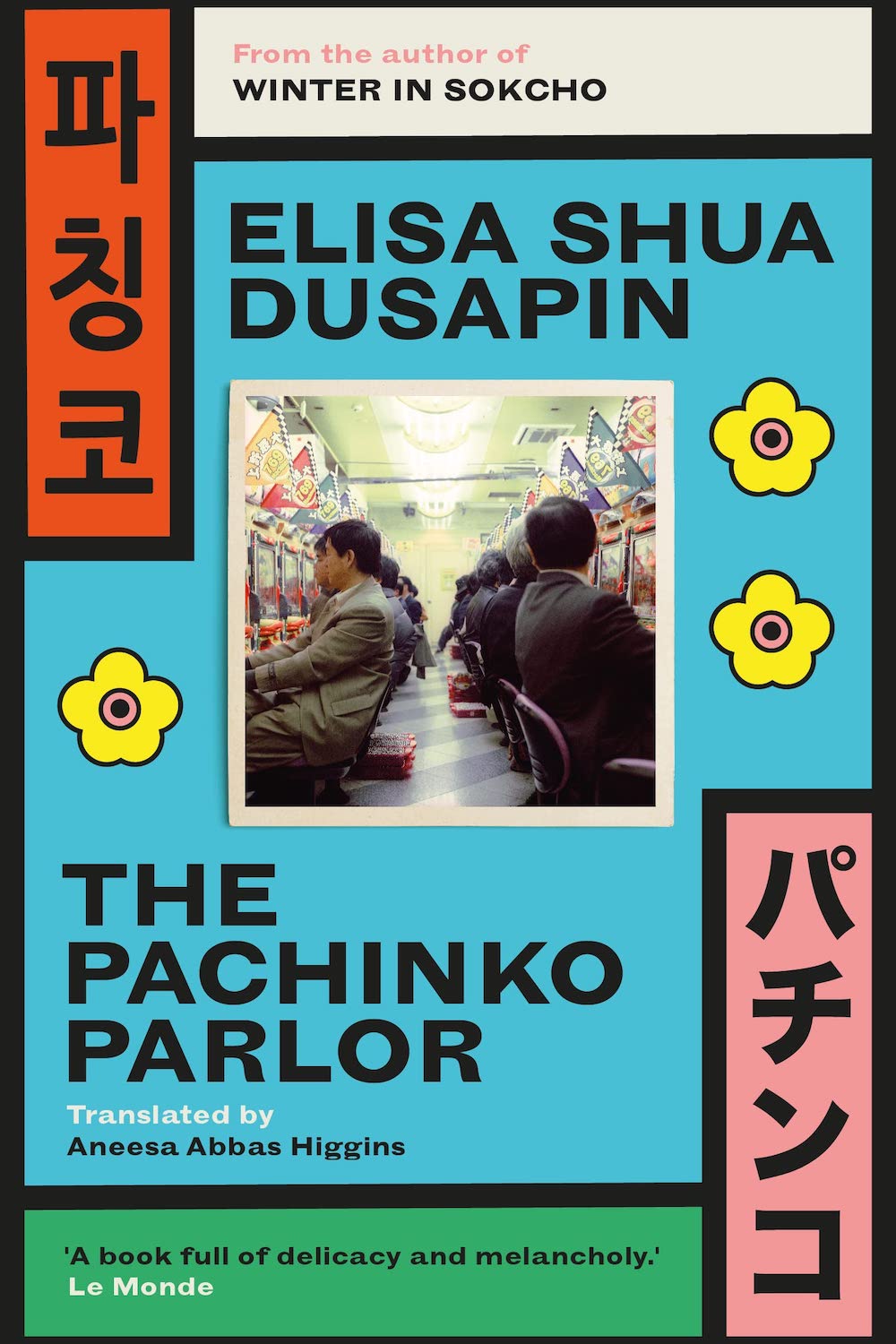
The Pachinko Parlor follows Claire, a young Swiss-Korean woman, who is visiting her grandparents—Korean expatriates—in Japan. They make a living running The Shiny, a small pachinko parlor. Claire is helping them prepare for a long-postponed first visit to South Korea, a difficult task because they are not keen to travel and refuse to speak Japanese, using instead gestures and a few Korean and English words to communicate.
Gradually, we discover the grandparents’ reason for their reluctance. Their country—Choson, pre-partition Korea—exists only in their memories. It is a place that Claire is no longer able to share with them, for, after immigrating to Switzerland as a child, she has lost her mother tongue. French is now her “main language,” foreign yet necessary in the life she has built. Although she longs for Korean, she has yet to recover it.
During the visit, Claire works as a French tutor for Meiko, a ten-year-old Japanese girl. Gradually, she becomes aware of Meiko’s unusual situation. Her father has left the family, and is likely to acquire a new identity—something that her mother, a distant, cold woman, believes rather common. They live in irregular accommodations, as the only residents of a former hotel, soon to be renovated and reopened under the brand Promise.
Just as with Claire and her grandparents, Meiko and her mother inhabit a precarious gray-zone built of memory. They are avoiding taking full stock of the places, people, and languages that they have lost. Such a limbo is, however, potentially temporary. Shua Dusapin’s empathetic and subtly crafted narrative, rendered beautifully by Higgins, allows us to witness how the first tremors of a change as necessary as it is unavoidable arrives in these lives.
—Maria Barrera-Agarwal
Present Tense Machine by Gunnhild Øyehaug, translated from the Norwegian by Kari Dickson
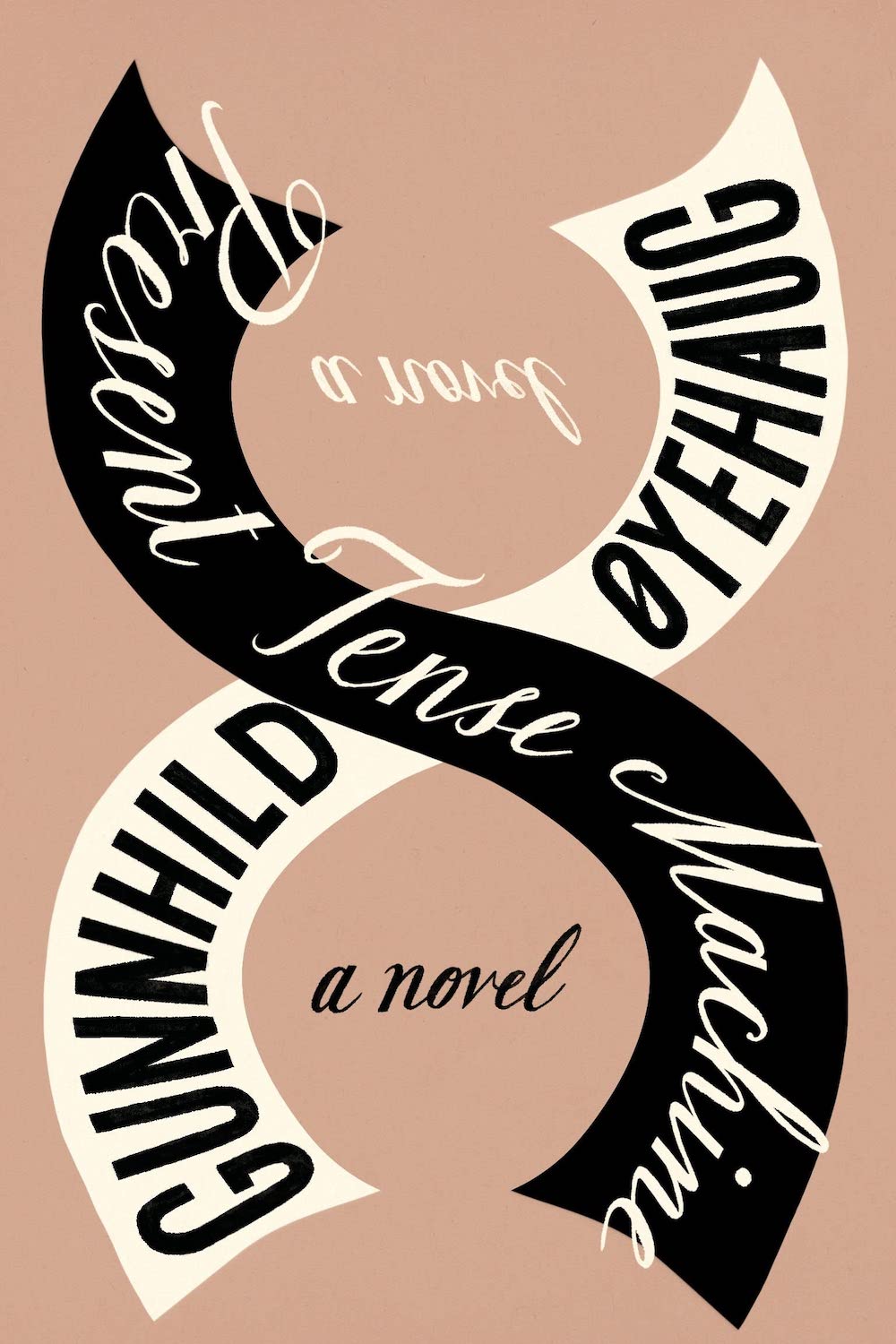
Can one mistaken word splinter us into another life? In an early scene in Gunnhild Øyehaug’s unforgettable Present Tense Machine, gorgeously translated by Kari Dickson, Anna is reading poetry in her garden along with her young daughter Laura, and misreads “trädgård,” which means garden, as the meaningless word “tärdgård.” In that second, a new life is created in which Laura doesn’t exist as her child. The novel shifts between these two parallel realities while exploring complex issues about identity—am I me without you?—and replications, like Erik Satie’s Vexations, which is also a running theme in the novel.
It’s especially delicious to consider the importance of that single misspoken word when considering books in translation. What a daunting task for any translator to contemplate misrepresenting a word, when that too might splinter readers’ lives! Dickson is more than up to the challenge, channeling Øyehaug’s nuanced and poetic narrative and intricate time and character shifts, while maintaining the work’s Norwegian soul. Craft excellence aside, this is a captivating and satisfying story that further establishes Øyehaug’s position as a contemporary writer to seek out in any language.
I can’t help but wonder: in random dimensional moments in time, when the innumerable planes of existence are nearly kissing each other, might hints of our alternate lives, the ones we don’t lead, slip through? Perhaps all books have the power to create multiverses within us. I’d like to think that in many of them, I’m reading Present Time Machine, grateful that writers like Øyehaug and Dickson are shifting our worlds with their perfectly placed words.
—Mandana Chaffa
Violets by Kung-sook Shin, translated from the Korean by Anton Hur
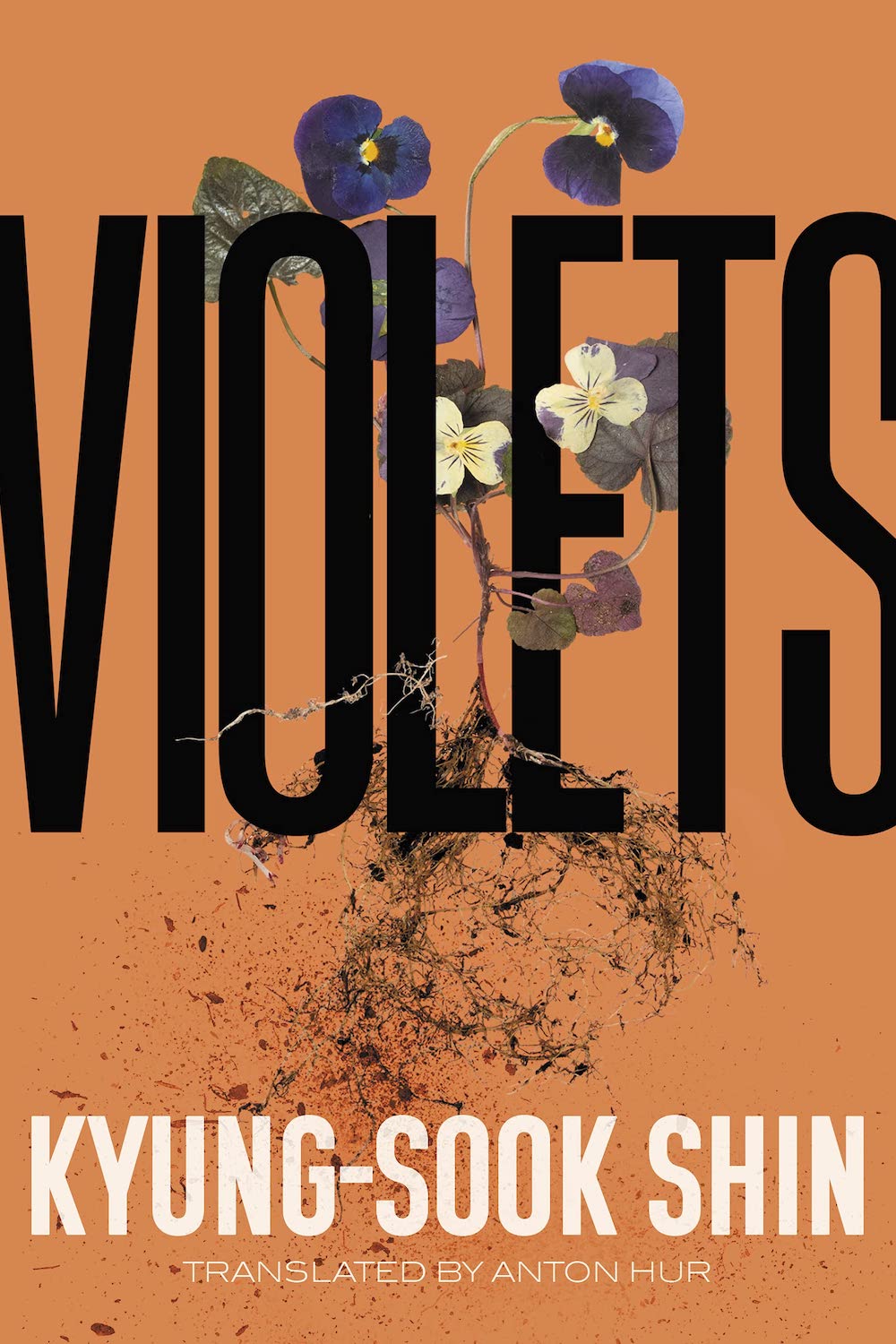
Among 2022’s best books was a new translation of Kung-sook Shin’s novel, Violets, published by the Feminist Press. A whisper-quiet story, Violets follows the childhood and young adulthood of San, a gentle person who answers an advertisement in a shop window reading, “Wanted: A woman to look after flowers.”
As San’s new coworker, Su-ae, teaches her how to care for plants, the novel fills with cool images: San “sprinkling the dry floor with water”; a street rustling its “canopy of ginkgo leaves”; Su-ae selecting “a pot with riverbed sand for good drainage.” The sand is for a palm tree that San has accidentally overwatered. “I’m not sure if it’ll survive,” Su-ae says, repotting it. San can’t keep the difficult memory of a field of rampaging minari tamped down. The flower store owner insists that plants grow better if you love them.
In an interview with Electric Lit, the novel’s translator Anton Hur called Shin, who has published seventeen novels, “a god of Korean literature.” He also praised Shin for her prose style in Korean. Eschewing “fancy words or complicated sentence structures,” he said, her writing is instead rhythmic and emotional. “It’s very difficult to decode,” he said, “but it’s very clear that she is writing to me in absolute silence.”
“Violets are very small plants,” Shin writes in her afterword to the new translation. “So small, they’re easily overlooked as weeds.” In Violets, her attention to inconspicuous phenomena—the shadow of a flower on a face, a root, a gift wrap ribbon—creates a drama of a hushed and very compelling sort.
—Jo Livingstone
Walk Me to the Corner by Anneli Furmark, translated from the Swedish by Hanna Strömberg
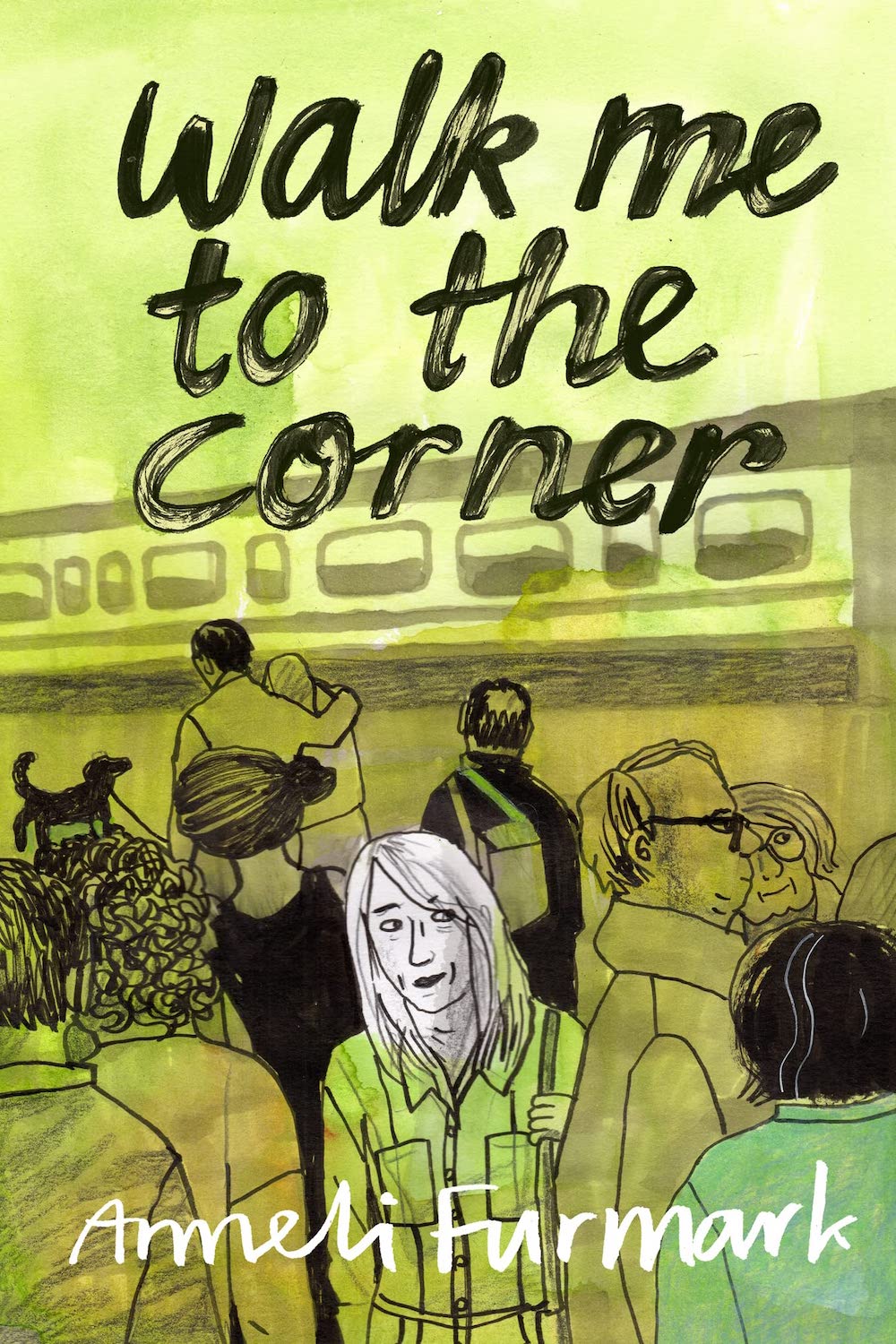
Translating a graphic novel requires precision. The book cannot grow to suit longer, English-language sentences. Dialogue must fit into the artist’s original speech bubbles. In Anneli Furmark’s Walk Me to the Corner, Hanna Strömberg makes this hard work seem effortless, translating the characters’ waterfalls of text messages as seamlessly as a therapist’s professional counsel.
In the novel, happily married Elise falls for a woman she has just met, Dagmar. Perhaps you’ve read this story before: an attempt at an open marriage; the ensuing passion and heartbreak; a new relationship. Think again. Anneli Furmark has written a standout of the genre, rendering her characters in textured, unforgettable prose while centering “revved-up” middle-aged love.
When I read about romantic love, I tend to fill in my own biography. A character blushes, awestruck. I think of the moment I turned in my chair and met my fiancé. It’s a rare novel that dissolves the self and makes me fall for the protagonist’s beloved. That’s the power of Walk Me to the Corner. Furmark writes and draws with the heightened, aching attention of a lover, and therefore, an obsessive, confessional energy drives the book forward. In an early scene, Dagmar says she’s an ear, nose, and throat doctor. The reader flips the page. We see a lightly zoomed in illustration of the woman, silver hair tucked behind an ear. Her strong nose, soft throat. Ear, nose, throat—my god. Dagmar!
Walk Me to the Corner is also deeply moving. After Elise admits to having feelings for someone else, her husband says: “I hope she doesn’t hurt you.” Elsewhere, Elise laments how we demean old lovers, seeing them as cute or funny. Elise’s adult son asks a question that has stuck with me, these many months since my first reading: “Aren’t young lovers as silly as old ones? As silly and as grand.”
—Nichole LeFebvre
When I Sing, Mountains Dance by Irene Solà, translated from the Catalan by Mara Faye Lethem
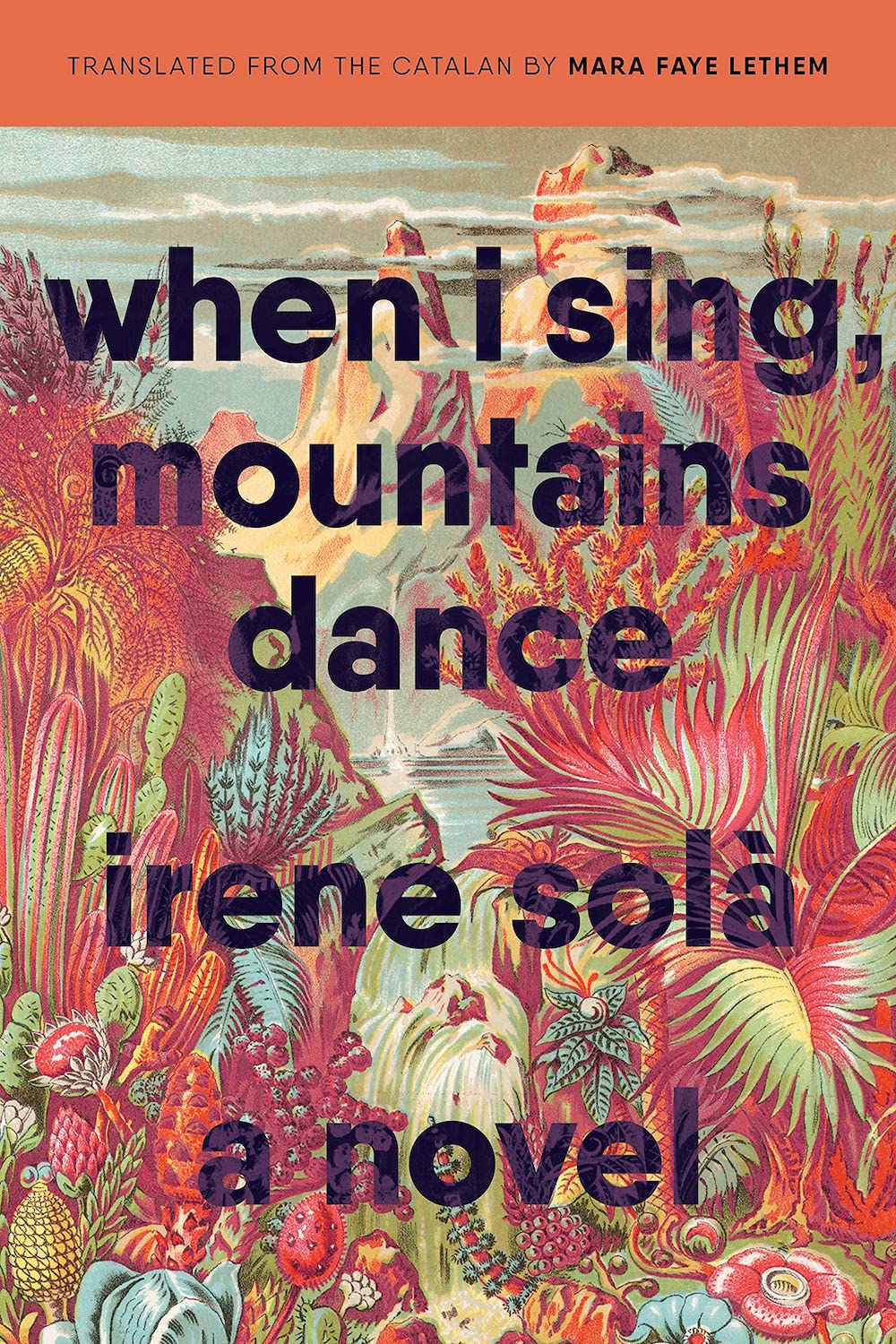
Catalan writer Solà’s second novel, which won several awards overseas, including the European Union Prize for Literature in 2020, is an ingeniously crafted tale of love, tragedy, convalescence, and accountability—to ourselves, each other, and our environment. It arrives in a lithe translation from Lethem that allows English-speaking audiences to envelop themselves in the novel’s myriad voices.
When I Sing presents the story of one family and one community, but its lessons jibe with our wider world. Sió, Domènec, and their children live below a tiny mountainside town in the Pyrenees near the border between Catalonia and France. Over the years, their fellow locals have included witches, water sprites, and giants, all of whom might be genuinely magical or simply folks who are misunderstood because they live life a bit outside the bounds of the ordinary.
Solà’s narrative whimsy catalyzes the novel’s endless revelations, with chapters told by characters both alive and dead, as well as from the perspectives of a roe deer, a dog, storm clouds, chanterelle mushrooms, and the Pyrenees themselves. These voices extol rural living compared with the “watered-down lives” led by those in the city. They demonstrate how hard it can be to “go back to being who you once were, before you learned fear.” And they repeatedly explore the enduring devastation of warfare and guns, often contrasting humanity’s violent propensities with the inherent tranquility of the natural world: “wars end but the mountains never do . . . the mountains are older than war, and wiser than war.”
Lethem’s translation is alternately contemplative, allowing readers to luxuriate in Solà’s rich imagination, and propulsive, hurtling along via a profusion of periods, fragmented sentences, and rhetorical repetition, as when the widowed and overworked Sió starts to sob after disciplining her children: “The crying starts like a small animal. Like a single cloud, like a thin fog in my chest. It starts like a tiny pain, like a slow swelling. Like a discomfort, like a small bone lodged in my throat, like a series of stones in my sternum. And it grows, little by little.” So too does Solà’s world grow, a tiny corner of the globe accreting voice after voice until it reaches majestic heights that dance in the light of Lethem’s song.
—Cory Oldweiler
You Can Be the Last Leaf by Maya Abu Al-Hayyat, translated from the Arabic by Fady Joudah
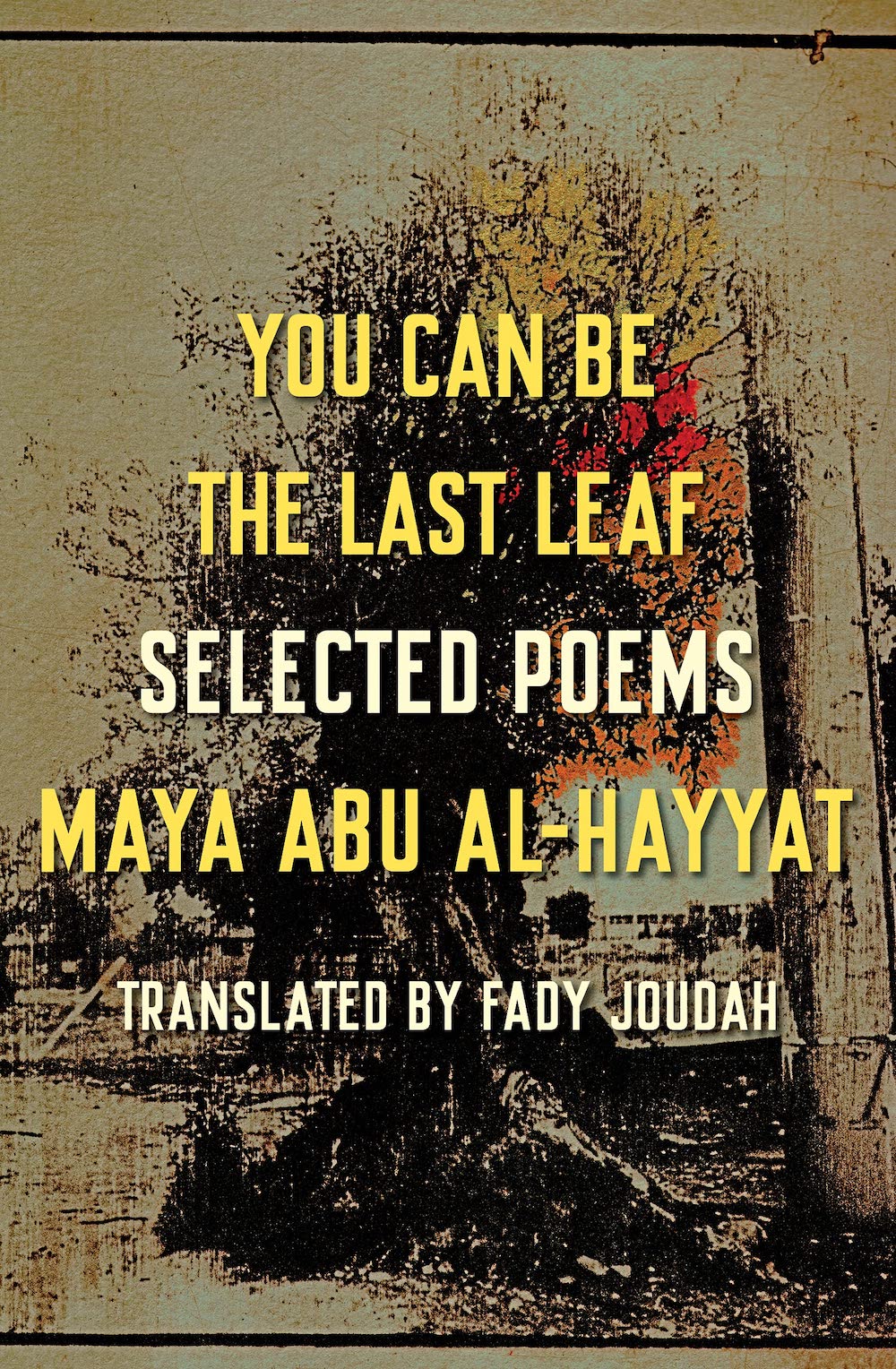
Each poem in Fady Joudah’s translation of Maya Abu Al-Hayyat’s You Can Be the Last Leaf arrives whole, a fluid thought, like one long drink of cold water that quenches a deep thirst. It’s difficult to quote just a few lines from the book since they’re often embedded in the cascade of an idea as it flows from one clause to the next. But here are a few that beautifully gain nuance and tension with each turn:
Tell me how you crossed the street
after you were released
from long detention—
it matters to me
what you’re thinking now
as you coerce your kids to sleep
in the middle of shelling
The clarity of such clausal lineation (what Joudah characterizes as “relentlessly direct”) becomes an increasingly essential tool for Abu Al-Hayyat to push back against the deceptions of war. A Palestinian poet living in Jerusalem, she speaks directly to the historical and political reality of the region from first-hand experience. The stunning progression across her four collections, from more elliptical early lyricism to the fierce directness of her recent work, reveals the “empty repetitive state” of the “stories [that] regurgitate us.”
Joudah skillfully renders Abu Al-Hayyat’s straightforwardness while also capturing tonal undercurrents of self-incrimination and—most importantly—love. The former comes through in several extraordinary poems that investigate how “the cunning brutality of Israeli colonialism trickles down to aspirations for the colonized to be in ‘good standing in a middle class / that guards itself against a painful death.’” But even more arresting is Abu Al-Hayyat’s insistence on love, literally. It is the noun that probably appears more often than any other in this collection. These poems—surprisingly joyful and filled with personal stories of all the people the author has loved—persevere even as they acknowledge that no one ever really comes back from war.
—Mira Rosenthal
Copyright © 2023 by Words Without Borders. All rights reserved.









